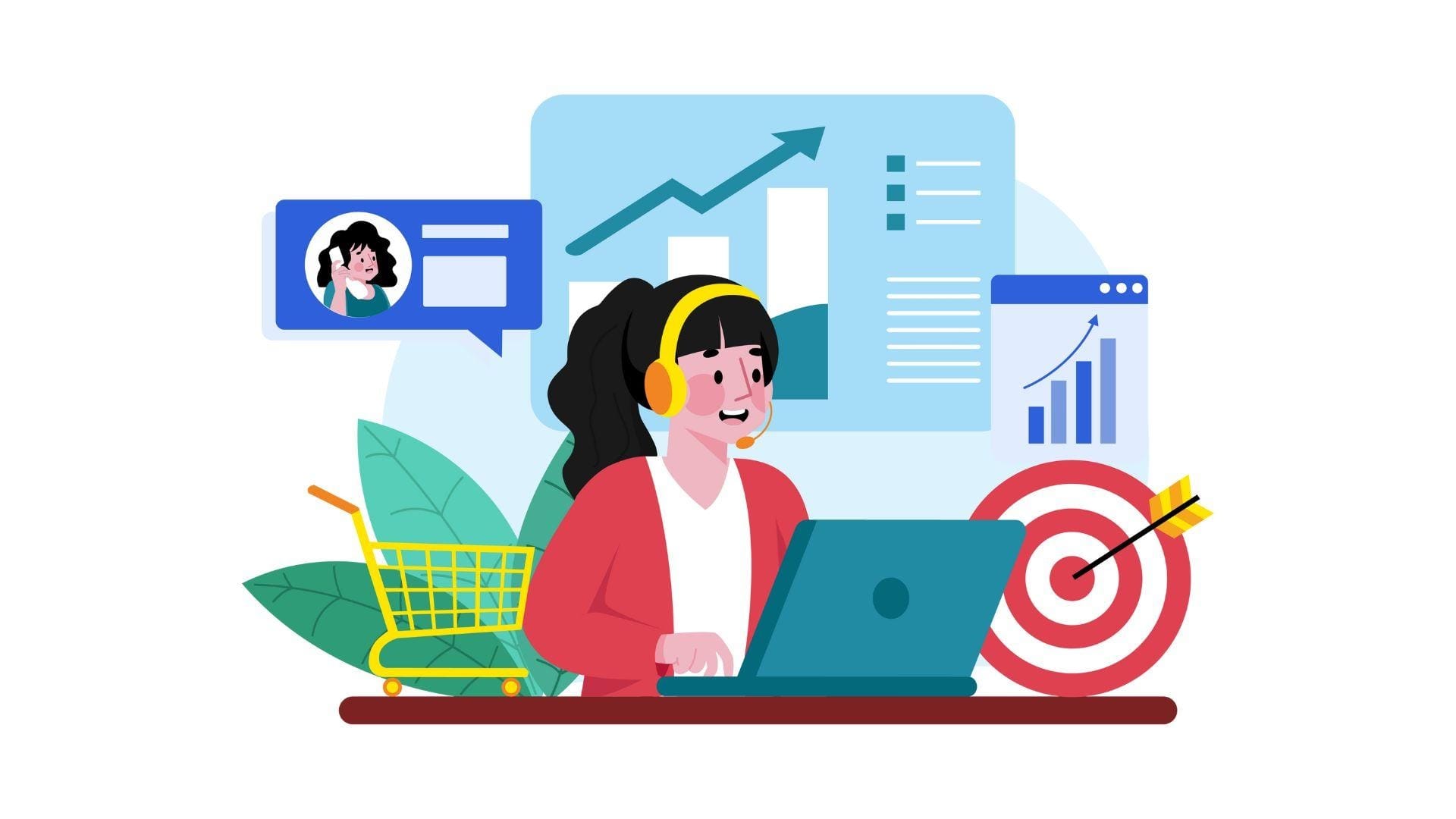How AI Sales Calls Are Boosting Efficiency, Personalization, and Conversions
Discover how AI sales calls boost efficiency, personalization, and conversions. Learn about AI tools that can optimize your sales process for better results.

What if your sales calls could be more effective, helping you close more deals without requiring extra daily hours? In B2B, sales teams face immense pressure to meet ambitious targets while doing time-consuming tasks like lead research, call scheduling, and follow-ups. Did you know that 70% of sales reps spend more time on non-selling activities than on engaging with prospects?
This imbalance is where AI comes in. By automating routine tasks and providing data-driven insights, AI tools enable sales teams to focus on high-value interactions, making AI sales calls smarter and more efficient, helping teams close more deals with less effort.
This blog will explore how AI is transforming sales calls, making them smarter and more efficient.
AI vs. Traitional Sales Calls
Sales calls have traditionally been a time-consuming process, requiring sales reps to manually sift through leads, craft personalized messages, and rely on gut feeling to gauge the potential of a prospect. However, with the rise of AI, the entire landscape is shifting.
Let’s compare traditional sales calls to AI sales calls in terms of key factors like speed, personalization, and scalability.
Also Read: AI SDR Sales: Building Trust in the Age of AI
AI-driven sales call platforms are reshaping the sales process, helping businesses enhance their outreach, improve call effectiveness, and increase conversion rates. These platforms enable you to have real-time insights, lead qualification, automated follow-ups, and more.
Top 5 AI Sales Calls Tools
Whether it's analyzing call sentiment, automating follow-ups, or enhancing lead qualification, these platforms are designed to improve the efficiency and effectiveness of your sales process. Below are the top platforms making waves in AI-driven sales calls:
Also Read: What Are SDR’s Email Marketing Campaigns? A Complete Guide
How AI Sales Calls Improve Sales Performance
AI is reshaping the sales landscape by enabling sales teams to work smarter, not harder. With AI sales call tools, sales calls have become more efficient, data-backed, and effective in driving conversions.
1. Streamlining Lead Qualification
AI-driven lead qualification can improve conversion rates by up to 21%. AI-powered platforms analyze vast amounts of data, from past interactions to customer behavior, to score and prioritize leads based on their likelihood to convert. By automating the lead-scoring process, sales teams can efficiently target high-quality leads with tailored outreach, leading to better sales performance.
2. Enhancing Personalization and Customer Engagement
AI is making sales calls more personalized than ever before. Using data from previous interactions, browsing history, social media activity, and more, AI tools craft messages that resonate with the individual needs of the prospect. Forbes reports that 80% of customers are more likely to buy from a company that offers personalized experiences. AI in sales calls ensures that these experiences are scalable, creating meaningful interactions at scale.
3. Automating Repetitive Tasks
AI sales tools can automate repetitive and mundane tasks that typically take up a sales rep’s time, like scheduling follow-up calls, sending emails, or managing CRM updates. This allows sales reps to focus more on high-value activities like building relationships, negotiating, and closing deals.
4. Improving Sales Forecasting Accuracy
Accurate forecasting ensures that sales teams are not only working on the right leads but also focusing their efforts at the right time, driving more efficient use of sales resources and boosting overall performance. AI helps improve sales forecasting by analyzing historical data and current trends to predict which leads are most likely to convert and when. This predictive capability allows sales teams to allocate resources more effectively and set realistic sales targets.
5. Real-Time Performance Monitoring and Feedback
AI tools provide real-time performance insights, analyzing sales calls as they happen. These platforms track key metrics like talk-to-listen ratios, sentiment, and customer objections, offering actionable feedback to sales reps during or after the call.
6. Scalability and Efficiency
AI makes it possible for even small sales teams to engage with hundreds or thousands of leads in a personalized, efficient way. This ability to scale sales efforts is crucial for businesses aiming to grow rapidly while maintaining a high level of customer engagement.
As AI continues to transform sales calls, tools like Alisha SDR are playing a pivotal role in driving performance. By automating lead qualification, managing follow-ups, and personalizing outreach, Alisha SDR enables sales teams to maximize efficiency and focus on high-value interactions.
How Alisha SDR Complements and Enhances AI Sales Calls
Alisha SDR plays a crucial role in complementing the overall sales process by automating key tasks like lead qualification, personalized outreach, follow-ups, and performance tracking. With its ability to scale, optimize, and streamline the entire sales call workflow, Alisha SDR ensures that sales teams can focus on what truly matters: building relationships and closing deals.
Here's how it works:
- Automated Lead Qualification: Alisha SDR uses AI to score and prioritize leads based on intent and behavior, ensuring that sales teams engage with prospects who are most likely to convert.
- Efficient Follow-Up Management: With automated follow-ups and scheduling, Alisha SDR ensures that no lead is left behind, maintaining consistent communication without manual effort.
- Personalized Outreach at Scale: By crafting hyperpersonalized emails and messages across multiple channels, Alisha SDR ensures each lead receives a relevant and personalized experience, improving engagement and response rates.
- Real-Time Performance Insights: Alisha SDR provides detailed analytics on outreach efforts, allowing sales teams to fine-tune their strategies and improve call outcomes.
Challenges of Implementing AI in Sales Calls
While AI offers immense potential to improve sales performance, there are several hurdles businesses must overcome to implement it effectively:
1. Resistance to Change
Sales teams may be resistant to adopting AI due to fears of job displacement or skepticism about its effectiveness. Overcoming this resistance requires clear communication about how AI can enhance their roles, not replace them.
2. Data Privacy and Compliance
AI requires access to vast amounts of customer data, which raises concerns around privacy and compliance with regulations like GDPR. Businesses must ensure AI tools are secure and meet all legal requirements to protect sensitive information.
3. Integration with Existing Systems
Integrating AI with current sales systems and CRMs can be complex. Compatibility issues may arise, requiring time and resources to ensure smooth operation without disrupting existing workflows.
4. High Initial Costs
The upfront investment in AI tools, training, and infrastructure can be significant. Smaller businesses may find these costs prohibitive, though the long-term ROI in terms of improved efficiency and sales performance can outweigh the initial investment.
5. Skill Gaps
AI tools require new skill sets, and not all sales reps may be familiar with these technologies. Comprehensive training is essential to ensure the team can use AI sales call tools effectively and to their full potential.
7 Key Steps to Implement AI in Your Sales Calls
Implementing AI in your sales calls can seem daunting at first, but with a structured approach, you can seamlessly integrate AI tools into your existing processes. Here’s a step-by-step guide to help you get started:
Step 1. Start with Clear Objectives
Before diving into AI tools, it's crucial to define what you want to achieve. Whether it’s improving lead qualification, enhancing personalization, or automating repetitive tasks, having clear objectives will help guide your AI implementation strategy.
Ask yourself: What specific pain points are you hoping to solve? Are you looking to automate follow-ups, score leads more efficiently, or analyze sales call performance?
Step 2. Choose the Right AI Tool for Your Needs
With the variety of AI tools available, choosing the right one for your sales process is essential. Consider tools that align with your business goals and are easy to integrate with your current systems. Focus on platforms that help you:
- Automate lead qualification and scoring.
- Personalize outreach at scale.
- Provide real-time insights and feedback during sales calls.
Step 3. Ensure Data Integration and Security
AI thrives on data, so it’s important that your sales tools integrate seamlessly with your existing CRM and communication systems. Whether it’s syncing data across platforms or ensuring that sales call data is tracked and recorded, integration is key to a smooth transition.
Data security is another critical factor. Ensure that the AI tools you select comply with data privacy regulations such as GDPR. Clear policies around data use and access will help mitigate privacy concerns.
Step 4. Invest in Training and Onboarding
AI tools can only be effective if your sales team knows how to use them properly. Invest in comprehensive training to ensure your team is familiar with the new system. Provide ongoing education to help sales reps adapt to the evolving AI tools.
Tip: Focus on user-friendly AI tools that require minimal technical expertise, so your team can quickly get up to speed.
Step 5. Start Small with a Pilot Program
To mitigate risks, start with a pilot program. Implement AI on a small scale within a single department or sales team. Measure the results, gather feedback, and make adjustments before scaling AI across the entire sales organization.
Example: Start by automating follow-ups for a small segment of your leads. Monitor how the system performs and tweak your approach based on performance data.
Step 6. Monitor and Optimize Performance
Once your AI tools are up and running, continuous monitoring is key. Track performance metrics like lead conversion rates, response times, and sales forecasting accuracy. Use these insights to refine your approach, improve outreach strategies, and ensure your sales team is maximizing the potential of AI.
Step 7. Scale AI Implementation Gradually
As your team becomes more comfortable with AI, you can gradually expand its role. Start scaling by integrating AI into other parts of your sales process—whether it’s automating prospect outreach, managing follow-ups, or providing detailed performance reports. By taking incremental steps, you ensure that the transition to AI is smooth and sustainable.
Pro Tip: Use AI’s automation capabilities to free up your team’s time, allowing them to focus more on high-value tasks like closing deals and building customer relationships.
Also Read: The Best 5 AI Sales Chatbots for Business in 2025
Conclusion
AI is revolutionizing sales calls, enabling teams to work smarter, not harder. By automating tasks, personalizing outreach, and providing real-time insights, AI empowers sales reps to close more deals with less effort. The future of sales calls is here, and it's powered by AI.
Incorporating tools like Alisha SDR, which combines AI-driven lead qualification, automated follow-ups, and personalized engagement to elevate your AI sales calls and sales performance. Ready to transform your sales calls? Discover how Alisha SDR can help you close more deals faster. Book a demo call today!


